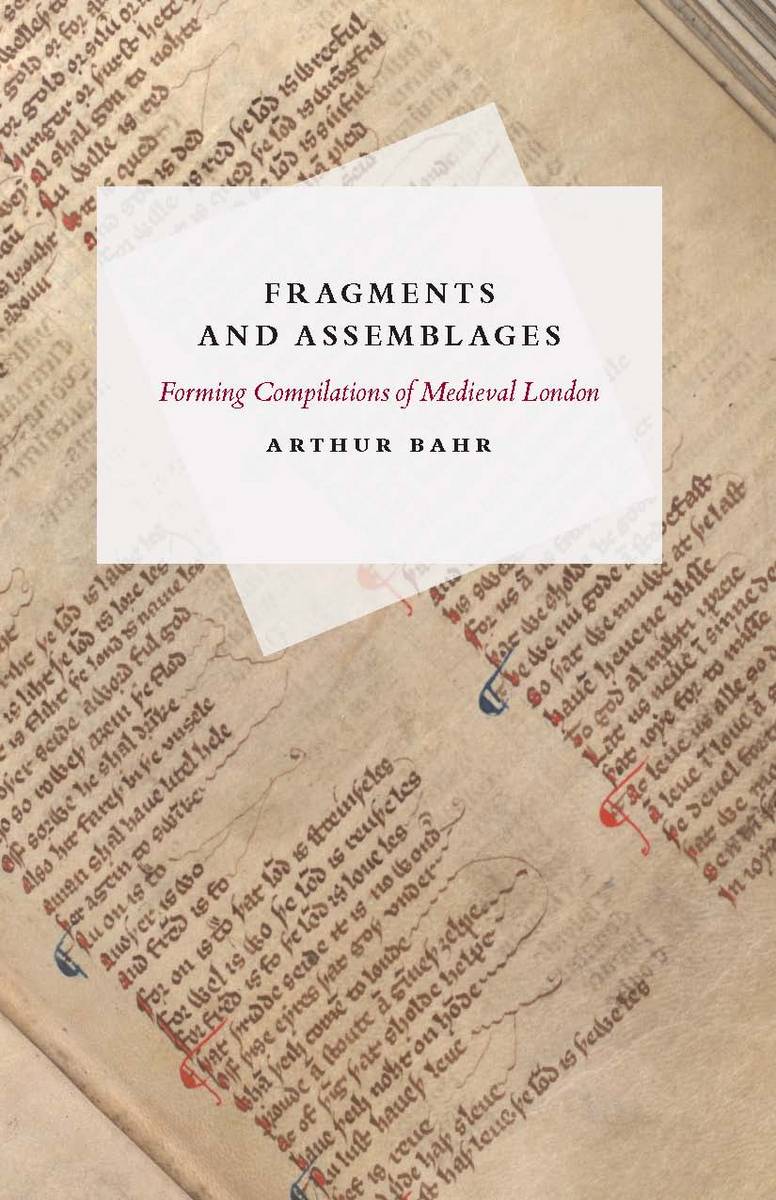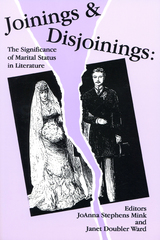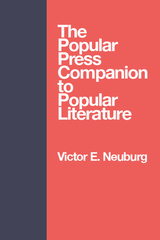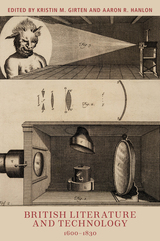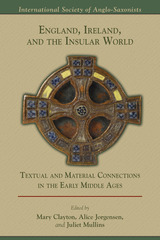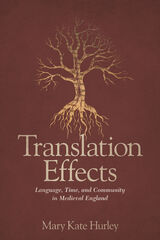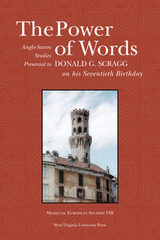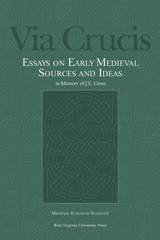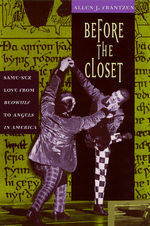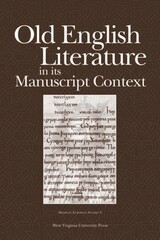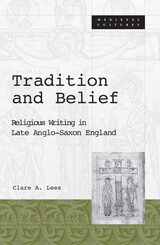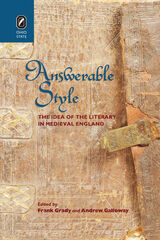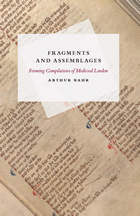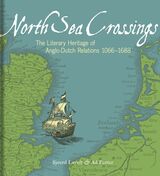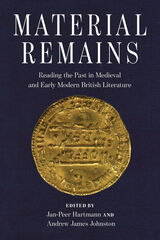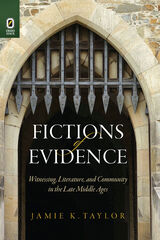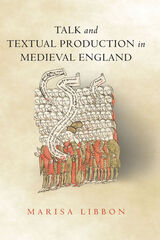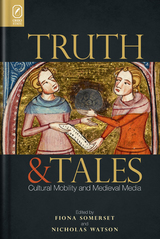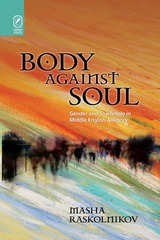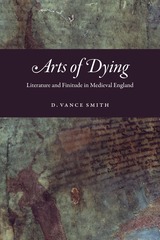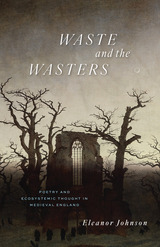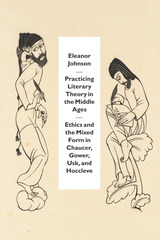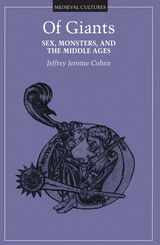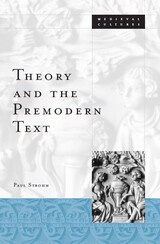“Arthur Bahr’s scholarship is deeply learned and technically skillful, as he invests codicology with the larger promises of formalism. But have no fear: Bahr’s prose sparkles with intellectual delicacy, energy, and pleasure. This is scholarship voiced in an especially agreeable and distinctive way. I enjoyed reading Fragments and Assemblages enormously.”
— James Simpson, Harvard University
“Fragments and Assemblages makes the striking claim that the standard treatment of Chaucer and other Ricardian poets, as figures who broke with the past in order to inaugurate a new kind of literary writing in English, must be revised in light of textual evidence. Arthur Bahr works carefully with fourteenth-century manuscripts in order to show us connections from Andrew Horn to the Auchinleck manuscript to Chaucer and Gower; he thereby stitches together the divided fourteenth century and demonstrates that literary production during the period was an ongoing and continuous project. At the same time, he also makes an important methodological statement about the significance of formalism to the study of manuscripts and to historical work. All of the texts he discusses are compilations, which he categorizes as either ‘fragments’ or ‘assemblages’ in order to suggest that there is a necessary dialectic between them: the works he describes all betray evidence of being assembled for a larger purpose, but they simultaneously exist as fragments, both physically and in the abstract. This double approach enables Bahr to construct an original and creative new account of fourteenth-century writing, one with which all scholars of late medieval literature will want to engage.”
— Maura Nolan, University of California, Berkeley
“In this remarkably erudite and elegantly argued book, Arthur Bahr makes the compelling case for the meaning of medieval literature in its manuscript environment. Building on much recent scholarship in the study of the handwritten book, Bahr shows how literary value often lies along the fissures of the fragment. Medieval English compilations—whether they be the concatenations of the Auchinleck manuscript, or the various assemblies of Chaucer’s Canterbury Tales—are not as unified as they might seem. Bahr’s powerful analyses of these and other texts as physical objects demonstrates, in his words, how ‘the literary can be found, delighted in and nurtured’ at the intersection of ‘codicological form and textual content.’ Fragments and Assemblages makes a powerful case for medieval literary study grounded equally in the archive and the imagination.”
— Seth Lerer, University of California, San Diego
“Bahr’s Fragments and Assemblages is the realization of a kind of literary codicology that has been long promised but slow to emerge. In this selective, elegant study of late medieval English literature, Bahr re-approaches several important texts and textual communities through the prism of manuscript research. The book weaves together codicological research with literary close readings and connects literary production with historical contexts to produce an exciting re-visioning of literate culture in fourteenth-century London. . . . Bahr cleverly posits critical practice itself as an assemblage, and constructs the readerly community, which includes authors, manuscript makers, readers and critics, as a kind of assemblage akin to the urban community of medieval London. He invites to rest of us to share in the ‘compilational game’ of reading manuscript culture in these expanded and fluid ways, and it is a challenge I hope many other readers will take up.”
— Janine Rogers, Mount Allison University, Review of English Studies
“[E]ngaging and thoroughly enjoyable. . . . Highly recommended.”
— A. L. Kaufman, Auburn University at Montgomery, Choice
“[Bahr’s] attractively written, often witty book, informed by a wide range of scholarship, elegantly demonstrates one way of using material form in the service of critical analysis.”
— Julia Boffey, Times Literary Supplement
"The most exhilarating aspect of [Bahr's] approach is his intelligent alertness to the wide, branching questions raised by any attempt to place books (as opposed to authors or readers) in their social and historical context. Deeply intrigued, rather than merely discouraged, by an old book’s fragmentary, incomplete, often damaged state, Bahr gives full rein to his subtle, probing attempts to understand the assumptions, fantasies, and accidents that caused such miscellaneity to survive, more or less intact, for our curious, speculative examination. He leaves his reader not only eager to open an old book but also more reflective about the extraordinary density of intellectual and imaginative desire that may be represented in the history of its physical state."
— Ardis Butterfield, Yale University, Common Knowledge
"Bahr’s excellent and highly readable new book offers us, in addition to a series of well-argued and fascinating arguments about individual medieval texts, a new methodology for manuscript studies. . . . Bahr urges medievalists to 'read compilationally,' by which he means taking seriously the authorial impulses not only of individual poets, but also of the compilers who set out their works in the larger manuscript contexts in which we now have them. . . . Scholars who are alienated by codicology or the history of the book will find in this book a way of integrating manuscript studies with close readings, historical analysis, and literary theory."
— Eleanor Johnson, Columbia University, Yearbook of Langland Studies
"Bahr's book not only demonstrates the ways in which two traditionally seperate spheres of inquiry, codicology and literary analysis, can work together to refresh well-mined primary sources; it also encourages scholars in other fields to contribute their interdisciplinary expertise to his project. Marshalling a range of critical approaches becomes itself a compilational endeavour."
— Anna Chen, University of Illinois at Urbana-Champaign, Journal of English and Germanic Philology
